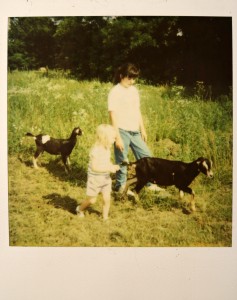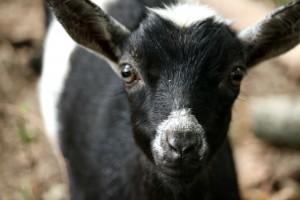Know well the condition of your flocks, and pay attention to your herds; For riches are not forever, nor does a crown endure to all generations. When the grass disappears, the new growth is seen, and the herbs of the mountains are gathered in, the lambs will be for your clothing, and the goats will bring the price of a field, and there will be goats’ milk enough for your food, for the food of your household, and sustenance for your maidens. – Proverbs 27:23-27
Tiramar Farms was founded in 2008 when I bought my first two Nigerian Dwarf does. The original herd name was Wonderland, however I had to change the herd name when joining the ADGA. Personally I think Tiramar is a better fit regardless!
I am a third generation goatherd, stemming from my grandmother, to my mother, and to myself, and a  fourth generation farmer from my great-grandfather, to my grandfather, to my dad, and finally to myself. (That’s me to the left as a toddler walking along with my mom’s LaManchas and my cousin.) My great-great grandparent’s through my mother’s dad were also farmers. You could say that farming is truly in my blood. My goals for Tiramar are simple: I desire to live a deliberate life while being a good steward of the wonderful gifts God has provided for us. I treat my animals humanely and as naturally as possible, and I enjoy providing food for myself and my family. I am walking my own road less traveled in hopes to live a purposeful life. I believe in sustainability, self-sufficiency, and keeping things as natural as possible. At Tiramar, we do things a little bit differently and with these objectives in mind. We practice a slower, more traditional life in the belief that it is better for us, the animals, and the earth. I believe that this is truly my calling, and I am happy that I am able to share the experience with my family. That I am able to help others do the same is the icing on the cake.
fourth generation farmer from my great-grandfather, to my grandfather, to my dad, and finally to myself. (That’s me to the left as a toddler walking along with my mom’s LaManchas and my cousin.) My great-great grandparent’s through my mother’s dad were also farmers. You could say that farming is truly in my blood. My goals for Tiramar are simple: I desire to live a deliberate life while being a good steward of the wonderful gifts God has provided for us. I treat my animals humanely and as naturally as possible, and I enjoy providing food for myself and my family. I am walking my own road less traveled in hopes to live a purposeful life. I believe in sustainability, self-sufficiency, and keeping things as natural as possible. At Tiramar, we do things a little bit differently and with these objectives in mind. We practice a slower, more traditional life in the belief that it is better for us, the animals, and the earth. I believe that this is truly my calling, and I am happy that I am able to share the experience with my family. That I am able to help others do the same is the icing on the cake.
Goats are my passion, though I love many aspects of homesteading and farming. Goats were the first livestock, aside from horses, to call Tiramar Farms home: two Nigerian Dwarf does named Brownie (below) and Sandy. I was hooked from the beginning and soon realized that goats are addicting. Goats are misunderstood by many and under-researched in the agricultural community due to the emphasis on the big ‘cash cows’ (pun intended) that make up the majority of commercial agriculture profits. Goats are extremely valuable and versatile, and — depending on breed — are capable of providing milk, meat, fiber, or a mix. As more and more people realize their value, they are becoming increasingly popular and researched. Slowly but surely, people are recognizing the worth of goats and that they are their own animal and not exactly like either of their relatives, cows and sheep. I love goats for their wonderful and unique personalities; “goats are just fun!” is an expression I hear (and say) frequently. I value goats as livestock for their incredible ability to pack a lot of production into smaller packages. Goats are truly the perfect mammal for the small modern homestead. Nothing beats handmade goat milk products or that rich and creamy fresh raw milk.

I started our with goats due to a simple desire to provide healthful raw milk for myself and my family that I know comes from healthy, humanely raised animals. I chose Nigerian Dwarfs for their smaller size, rich milk, vibrant array of colors, and for the fact that they were listed on The Livestock Conservancy’s list of endangered heritage livestock breeds in 2008. Thankfully, due to the increased popularity of these miniature milk goats, Nigerians were able to move off the endangered list in 2013 and their numbers have fully recovered. Nigerians are a wonderful choice for smaller homesteads and those interested in making cheese (Nigerian milk has the highest average butterfat of all the dairy breeds). Their smaller size makes them easier to handle and house than the larger breeds. They don’t produce as much milk as standard breeds, but well bred Nigerians produce a high amount for their size. The average production is 1-2 quarts of milk a day, but many well bred does produce more. Poorly bred does may produce less. This is plenty of milk for many small families.
Along the way I have discovered that I also love Lamanchas and Miniature Lamanchas (a cross between a female Lamancha and male Nigerian) as well, and have started a fledgling MiniMancha herd as well. I plan to expand my MiniMancha herd in the future, but for the time being I am primarily focusing on improving my Nigerian herd. I am not sure when, but I’m sure I will have more “earless wonders” in the future.
I selectively breed for healthy and productive animals that also maintain the standards set for their breed. Milk production is the most important thing in my breeding program, but I do not breed for production to the detriment of other important qualities. I would rather have a dependable doe with moderate production who maintains body condition easily with less input, has good natural parasite resistance and immunity, has few kidding problems, and whose conformation and udder structure holds up over time than a doe who bursts the bucket but struggles to maintain her health and condition in the process or who has difficulty birthing her kids. My goal is to have sustainable livestock that can be managed as naturally as possible.

When compared to a commercial dairy, I run a comparatively small herd. This allows me to truly know each animal that I own. My livestock are not simply numbers to me — they are living, breathing creatures with unique personalities. By not having excessive numbers of animals, I am better able to maintain the health and well being of my animals and to fully enjoy them. The priorities for my herd are in the following order: 1. Health 2. Production and Milkability 3. Conformation 4. Personality and 5. Aesthetics. You can’t milk color, but I do enjoy a variety in my herd. I always say that if I have to look at something everyday, it might as well be pretty!
Herd health is of major importance to me. Unhealthy animals cannot produce healthy food. My whole herd has tested negative for CAE and Johnes and I have had no sign of CAE, Johnes, or CL in my herd. I run repeat tests, usually when pregnancy testing, and quarantine and test all new incoming stock. I only purchase new stock from breeders I trust who also have clean and tested herds and who maintain their herds with the same level of care that I do. Tennessee is an accredited free state for tuberculosis and brucellosis. I post copies of my herd health test results here.

I raise my goats as naturally as possible. I employ rotational grazing as much as I can (improving my system every year), provide proper mineral supplementation, and feed primarily good quality grass hay and alfalfa. My milking girls and growing kids are usually the only ones to receive grain, which is a soy-free mix of oats and black oil sunflower seeds. I take preventative measures to maintain my goats’ health and avoid giving medications as much as possible, but sometimes goats do need to be dewormed or given medication. I am against the “therapeutic” or “preventative” use of chemical medications, but I will not sacrifice my animal’s well being for the sake of avoiding medications any more than I would allow myself or a loved one to die from a treatable illness because we didn’t want to take antibiotics. There is a time and a place for modern medication, and I’m thankful to have it when I need it. (And happy to avoid it when I don’t!) There is a lot more information about how I manage my herd on my Herd Management page.
I am always striving to improve my herd and breed the best animals that I can. I do not currently show my goats due to time constraints and biosecurity concerns, but I believe there is a solid foundation there for showing. Starting in 2018 I will also be participating in linear appraisal and DHI production testing.
Please take a look around the website. I’ve included as much information as possible to try to provide answers to common questions, share how I personally manage my herd, and keep the website up to date as far as who is for sale. Usually if a goat is not on the for sale page it isn’t available — the exception is during early kidding season when I may get behind posting updates here. I recommend following the farm on Facebook, where I update first when kids are born, or contacting me if you are wanting to purchase a kid. I rarely have adult stock for sale as I tend to get too attached by the time they’re adults to sell them.
Thanks for visiting!
I went to the woods because I wished to live deliberately, to front only the essential facts of life, and see if I could not learn what it had to teach, and not, when I came to die, discover that I had not lived. – Henry David Thoreau






